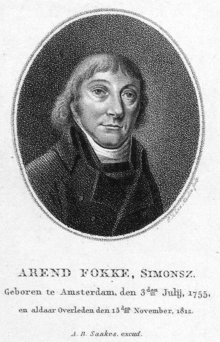Arend Fokke Simonsz
Arend Fokke Simonsz (3 July 1755 – 15 November 1812) was a Dutch writer and intellectual.
Arend Fokke Simonsz | |
|---|---|
 | |
| Born | 3 July 1755 Amsterdam, Netherlands |
| Died | 15 November 1812 (aged 57) Amsterdam, Netherlands |
| Occupation | Writer |
Biography
Arend Fokke Simonsz was born to Simon and Cornelia Fokke. Simonsz is best remembered as a writer,[1] but was also an important figure in the literary world at the end of the eighteenth century. He had for some time a publishing house and was a member of many literary societies. One of his most famous works, Het toekomende jaar 3000, is one of the earliest written examples of a utopia, and probably one of the first in Dutch literature.[2] Many of his books where critical analyses of current events and trends.[3] He had established himself as a critical observer, especially of the French government at the time. Though not illegal, this critical view brought him into the close eye of the authorities.[3]
He died at the age of 57 in Amsterdam.
Bibliography
- Dichtlievende mengelingen (1783)
- De moderne Helicon (1792)
- Het toekomende jaar 3000 (1792)
- Cathechismus der Weetenschappen, schoone Kunsten en fraaije Letteren (1794–1802)
- Proeve van een ironiesch-comiesch woordenboek (1797)
- Het onscheidbaar drietal redenwezens verlichting, deugd en tijd (1799)
- Dorus of het wonderwind (1808)
- Boertige reis door Europa (1794–1806)
References
- DBNL. "Arend Fokke Simonsz · dbnl". DBNL.
- "Het toekomend jaar 3000". gjclokhorst.nl.
- Jenson, Lotte. "Biografisch Woordenboek van Nederland: 1780–1830", Huygens ING, 12 November 2013. Retrieved on 6 May 2016.
External link
![]()